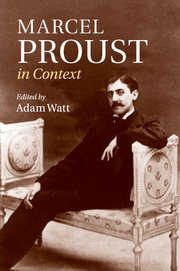Book contents
- Frontmatter
- Contents
- List of Illustrations
- Notes on contributors
- Figure I. Marcel Proust, portrait in oils by Jacques-Émile Blanche, 1892
- Preface
- Figure 2. Proust photographed on his death-bed by Man Ray, 1922
- Note on the text
- Chronology
- Part I Life and works
- Part II Historical and cultural contexts
- i. The arts
- ii. Self and society
- Chapter 14 Freud and psychoanalysis
- Chapter 15 Sexuality
- Chapter 16 Health and medicine
- Chapter 17 Technology and science
- Chapter 18 Religion
- Chapter 19 Travel
- Chapter 20 Journalism
- Chapter 21 Politics and class
- Chapter 22 The Dreyfus Affair
- Chapter 23 The First World War
- Part III Critical reception
- Further reading
- Index
- References
Chapter 18 - Religion
from ii. - Self and society
Published online by Cambridge University Press: 05 November 2013
- Frontmatter
- Contents
- List of Illustrations
- Notes on contributors
- Figure I. Marcel Proust, portrait in oils by Jacques-Émile Blanche, 1892
- Preface
- Figure 2. Proust photographed on his death-bed by Man Ray, 1922
- Note on the text
- Chronology
- Part I Life and works
- Part II Historical and cultural contexts
- i. The arts
- ii. Self and society
- Chapter 14 Freud and psychoanalysis
- Chapter 15 Sexuality
- Chapter 16 Health and medicine
- Chapter 17 Technology and science
- Chapter 18 Religion
- Chapter 19 Travel
- Chapter 20 Journalism
- Chapter 21 Politics and class
- Chapter 22 The Dreyfus Affair
- Chapter 23 The First World War
- Part III Critical reception
- Further reading
- Index
- References
Summary
A novel of crossings, frictions and fusions, the Recherche is also a site of productive aesthetic and moral tensions in its engagement with religion. Proust's own Catholic/Jewish heritage situates him at the intersection of different rituals, practices and beliefs, just as his historical context provided the stage for a turbulent clash between the two traditions. The Dreyfus Affair became the trigger for widespread anti-Semitic feeling, while also entrenching and intensifying a strand of right-wing Catholic thinking prevalent since the late nineteenth century. This was also a period of increased interest in Eastern religions and in alternative belief systems such as spiritualism, all of which leave their traces on the novel. Occupying a privileged, ‘in-between’ space afforded Proust some of the detachment of the quasi-ethnographic observer who considers religion as a means of cementing group identities, attributing value or establishing and maintaining principles of conduct. In addition, this ethnographer uses the lens of religious ritual in order to make sense of the secular. Yet the ethnographer's mask of objectivity also slips, most obviously in his portrayal of characters who are the self-professed embodiments of religious belief and/or those who are rejected by it.
Proust croyant?
Proust's personal correspondence offers a rich mine of references to religious belief that tempt us into pinning down his own faith (or lack thereof). Yet Proust's desire to comfort or connect with his addressee inflects his letters, such that evidence of belief here remains a tantalizing source of ‘frictions’. In a letter to Georges de Lauris in 1906, for instance, Proust asks ‘whether your mother was religious, found consolation in prayer. Life is so dreadful that all of us must turn to it’ (Corr, vi, 220); while a letter of 1908 urges Mme Straus: ‘In Heaven's name, not a word about any of this to Mme Ganderax. In Heaven's name . . . in which, alas, neither of us believes’ (Corr, viii, 278).
- Type
- Chapter
- Information
- Marcel Proust in Context , pp. 137 - 144Publisher: Cambridge University PressPrint publication year: 2013



